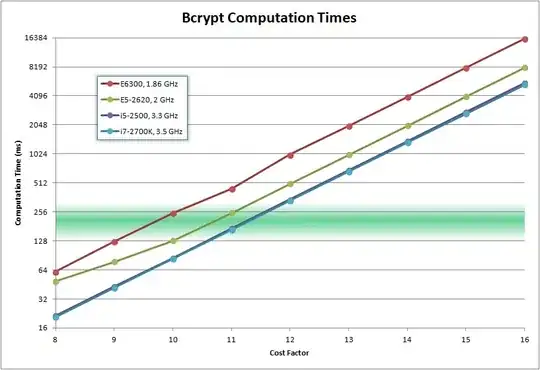Short Version
The number of iterations that gives at least 250 ms to compute
Long Version
When BCrypt was first published, in 1999, they listed their implementation's default cost factors:
- normal user: 6
- super user: 8
A bcrypt cost of 6 means 64 rounds (26 = 64).
They also note:
Of course, whatever cost people choose should be reevaluated
from time to time
- At the time of deployment in 1976, Unix's
crypt could hash fewer than 4 passwords per second. (250 ms per password)
- In 1977, on a VAX-11/780,
crypt (MD5) could be evaluated about 3.6 times per second. (277 ms per password)
That gives you a flavor of the kind of delays that the original implementers were considering when they wrote it:
- ~250 ms for normal users
- ~1 second for super users.
But, of course, the longer you can stand, the better. Every BCrypt implementation I've seen used 10 as the default cost. And my implementation used that. I believe it is time for me to to increase the default cost to 12.
We've decided we want to target no less than 250ms per hash.
My desktop PC is an Intel Core i7-2700K CPU @ 3.50 GHz. I originally benchmarked a BCrypt implementation on 1/23/2014:
1/23/2014 Intel Core i7-2700K CPU @ 3.50 GHz
| Cost | Iterations | Duration |
|------|-------------------|-------------|
| 8 | 256 iterations | 38.2 ms | <-- minimum allowed by BCrypt
| 9 | 512 iterations | 74.8 ms |
| 10 | 1,024 iterations | 152.4 ms | <-- current default (BCRYPT_COST=10)
| 11 | 2,048 iterations | 296.6 ms |
| 12 | 4,096 iterations | 594.3 ms |
| 13 | 8,192 iterations | 1,169.5 ms |
| 14 | 16,384 iterations | 2,338.8 ms |
| 15 | 32,768 iterations | 4,656.0 ms |
| 16 | 65,536 iterations | 9,302.2 ms |

Future Proofing
Rather than having a fixed constant, it should be a fixed minimum.
Rather than having your password hash function be:
String HashPassword(String password)
{
return BCrypt.HashPassword(password, BCRYPT_DEFAULT_COST);
}
it should be something like:
String HashPassword(String password)
{
/*
Rather than using a fixed default cost, run a micro-benchmark
to figure out how fast the CPU is.
Use that to make sure that it takes **at least** 250ms to calculate
the hash
*/
Int32 costFactor = this.CalculateIdealCost();
//Never use a cost lower than the default hard-coded cost
if (costFactor < BCRYPT_DEFAULT_COST)
costFactor = BCRYPT_DEFAULT_COST;
return BCrypt.HashPassword(password, costFactor);
}
Int32 CalculateIdealCost()
{
//Benchmark using a cost of 5 (the second-lowest allowed)
Int32 cost = 5;
var sw = new Stopwatch();
sw.Start();
this.HashPassword("microbenchmark", cost);
sw.Stop();
Double durationMS = sw.Elapsed.TotalMilliseconds;
//Increasing cost by 1 would double the run time.
//Keep increasing cost until the estimated duration is over 250 ms
while (durationMS < 250)
{
cost += 1;
durationMS *= 2;
}
return cost;
}
And ideally this would be part of everyone's BCrypt library, so rather than relying on users of the library to periodically increase the cost, the cost periodically increases itself.
